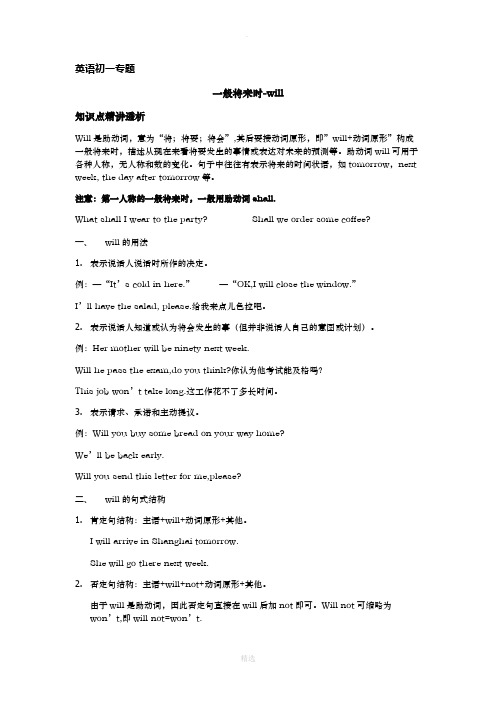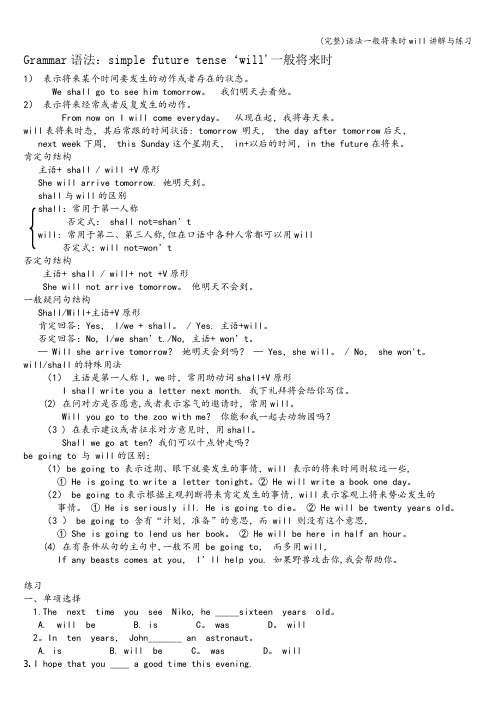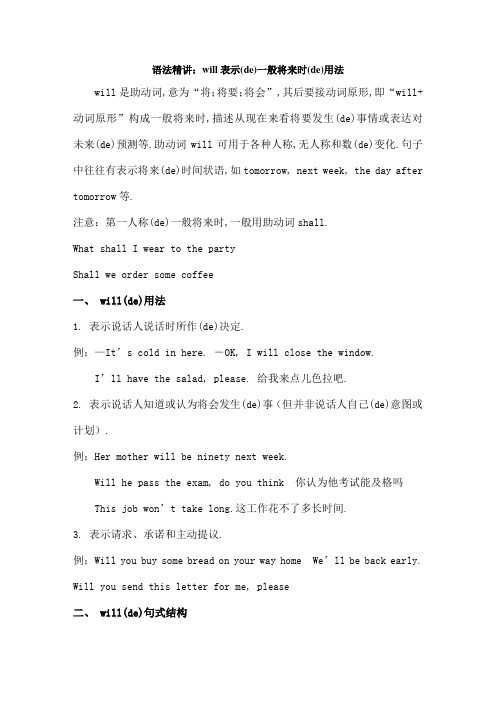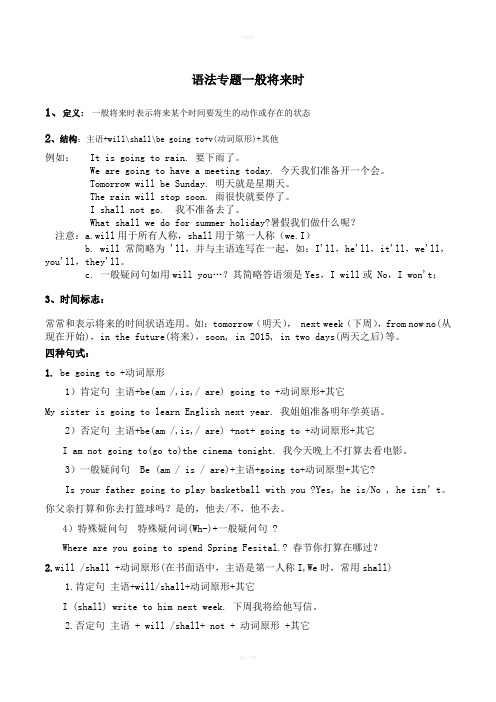语法一般将来时will讲解与练习图文稿
一般将来时begoingto与will的解析和练习

练习4: 完形填空
The party (1) at 8 pm tomorrow. We (2) many things to prepare. First, we (3) some food and drinks. Then we (4) the furniture and (5) some music. We hope you can join us!
使用正确的动词和时间状语。
练习8: 用一般将来时回答问题
使用正确的动词形式描述将发生的事情。
一般将来时中的日常口语表达
常用短语
1. I am going to… (我打算… ) 2. She will probably… (她可能会… ) 3. He will most likely… (他很可能会… )
一般将来时 bgoingto 与 will 的解析和练习
一般将来时是英语中最常用的时态之一,它用来描述将要发生的事情或预测 未来。本文将讨论一般将来时的两种构成方式:be going to 和 will。我们将 解析它们的用法,区别,在多种情景中的应用,并提供丰富的练习来帮助你 熟练掌握这种时态。
一般将来时的概述
时间状语从句的使用方法
时间状语从句用于描述一种更具体的时间或日期,并且通常以连词“when”或 “while”开始。
其他表示未来的形式
除了一般将来时,还有许多其他描述未来的语法形式,如进行时将来时和完 成时将来时。
一般将来时中的动词时态
动词时态用于描述正在进行的动作,是否完成或是否在将来进行。未来进行时态,将来完成时态和现在 完成进行时态均用于将来某个时刻或动作的描述。
练习3: 改变句子的时态
练习1
改写下面的句子,用将来进行 时: "I will be studying English tomorrow."
2020年六年级英语一般将来时will讲解PPT

-- _W__il_l ________ your mother go shopping this weekend? -- No, _s_h_e_________ _w_o_n_’t________.
3. -- 下周六你在这吗? -- 我不在。我要去拜访我的老师。
2. The man will come here.
变成否定句: __T_h_e__m_a_n_w__il_l _n_ot__c_o_m_e__h_e_re_.____________________________ 变成一般疑问句:__W_i_ll_t_h_e__m_a_n__co_m__e_h_e_r_e_?___________________________ 肯定回答:__Y_e_s_, _h_e_w__il_l._________ 否定回答:__N_o_,_h_e_w__o_n_’t_. ____________
4. What will your little brother does? _d_o_______
5. There will is a football match. _b_e_______
二、根据中文意思,把下面的句子补充完整。
1. --下个星期二你会做什么? -- 我会去踢足球。
--What _w_i_ll________ you _d_o__________ next week? -- I _w_i_ll_________ play football.
-- _W__il_l________ you _b_e__________ here this Saturday? -- No, _I__ w__o_n_’t_. I _w_i_ll_ _v_i_s_it________ my teacher.
最新一般将来时课件will的用法课件ppt

Functional Practise:
1.Ihope that you__ a good time this evening. C
A.have B.are having C.will have D.has
jobs.
dull jobs.
Will he do dull Yes, he will.
jobs?
No ,he won`t.
There will be a There won`t be Will there be a Yes,there will. computer in it. a computer in it. compuer in it. No,there won`t.
一般将来时课件will的用法
我们除了用“be going to+动词原形” 可以表示一般将来时外, 我们还可以用“will+ 动词原形”来表示一般 将来时.
一般将来时的主要用法:
1、表示将来某一时刻的动作或状态: We will come to see you the day after tomorrow. There will be a wonderful show next week.
will句式总结:
肯定
否定
一般疑问 回答
I will have
I won`t have Will I have
Yes,I will.
many presents. many presents. many presents? No,I won`t.
He will do dull He won`t do
一般将来时will

英语初一专题一般将来时-will知识点精讲透析Will是助动词,意为“将;将要;将会”,其后要接动词原形,即”will+动词原形”构成一般将来时,描述从现在来看将要发生的事情或表达对未来的预测等。
助动词will可用于各种人称,无人称和数的变化。
句子中往往有表示将来的时间状语,如tomorrow,next week, the day after tomorrow等。
注意:第一人称的一般将来时,一般用助动词shall.What shall I wear to the party? Shall we order some coffee?一、will的用法1.表示说话人说话时所作的决定。
例:—“It’s cold in here.”—“OK,I will close the window.”I’ll have the salad, please.给我来点儿色拉吧。
2.表示说话人知道或认为将会发生的事(但并非说话人自己的意图或计划)。
例:Her mother will be ninety next week.Will he pass the exam,do you think?你认为他考试能及格吗?This job won’t take long.这工作花不了多长时间。
3.表示请求、承诺和主动提议。
例:Will you buy some bread on your way home?We’ll be back early.Will you send this letter for me,please?二、will的句式结构1.肯定句结构:主语+will+动词原形+其他。
I will arrive in Shanghai tomorrow.She will go there next week.2.否定句结构:主语+will+not+动词原形+其他。
由于will是助动词,因此否定句直接在will后加not即可。
七年级下册一般将来时复习讲解与练习

感谢您的观看
THANKS
七年级下册一般将来时 复习讲解与练习
目录 CONTENT
• 一般将来时的基本概念 • 一般将来时的语境与运用 • 一般将来时的练习与巩固 • 常见错误与纠正方法 • 一般将来时与其他时态的比较 • 综合练习与测试
01
一般将来时的基本概念
定义与用法
定义
一般将来时是表示将来某个时间将要 发生的动作或存在的状态,常与表示 将来的时间状语连用,如tomorrow 、next week等。
总结词:提高运用能力
在此添加您的文本16字
详细描述:通过填空练习,让学生在实际语境中运用一般 将来时,提高语言运用能力和语境理解能力。
在此添加您的文本16字
总结词:拓展词汇和表达方式
在此添加您的文本16字
详细描述:在填空练习中,可以加入一些常用词汇和表达 方式,帮助学生拓展语言知识,提高语言表达能力。
综合写作练习
总结词
提升写作水平
详细描述
通过写作练习,让学生在实际写作中运用一般 将来时,提高写作水平和表达能力。
总结词
培养逻辑思维能力
详细描述
在写作练习中,可以引导学生思考和组织语言,培 养逻辑思维能力,提高写作质量。
总结词
促进语言实际运用能力
详细描述
写作练习可以让学生在实践中运用语言,提高实际运用 能力和跨文化交流能力。
与过去时区分
过去时表示已经发生的事情,而一般将来时表示尚未发生的事情。例如,“我昨 天去了超市”应该使用过去
03
一般将来时的练习与巩固
填空练习
总结词
填空练习是巩固一般将来时的有效方法,通过填空练习,学生可以加深对一般将来时态的理解和运用 。
一般将来时态讲解(共25张PPT)

• I don't think the test will be very difficult. 。
②用于“祈使句 + and + 陈述句” 中
I don’t think it will rain this afternoon.
I am hungry. I think I’ll have something to eat.
表示看法,观点
“There be”句型的一般将来时 肯定句: There will be +名词+其他成份 [注意]:无论后面加单数名词或复数形式,be都必须用原形。
shall适用于第一人称I,We;而will适用于所有人称。 通常可以用will来代替shall。 will,shall均可缩写为:'ll,如:
I will= I'll; she will = she’ll;will not 和shall not分别可以 缩写为 won't 和shan't。
1.一般将来时的用法
4. be about to + 动词原形。 表示 (1)“即将做”或“马上做”
(2)因此,句子不能再用时间状语。
Don’t leave. Li Lei is about to come. 不要走了,李蕾就要来了。 Be quiet. The concert is about to start. 安静下来,音乐演唱会就要开始了。
• My uncle will come to see me every Saturday.
• 我叔叔每个星期六都会来看我。
• The students will have five English classes per week this term.
《Will一般将来时》课件

1 Positive
主语 + will + 动词
2 N eg ative
主语 + will not + 动词
3 Question
Will + 主语 + 动词
一般将来时的用法
表达意愿
我将会去参加明天的会 议。
预测未来
明天会下雨。
提出建议
你应该明天早点休息。
例句和练习
1
例句
明天我将和朋友去看电影。
例句
意愿、预测、建议等
技巧
表达自信、使用时间表达、 多练习
使用一般将来时的技巧
Be confident
积极表达信心和决心。
Use tim e ex p res s io n s
明天、将来、下个星期 等词汇可以增强时态的 表达。
Practice with exercises
多做一些练习可以更好 地掌握一般将来时的用 法。
总结和要点
构成
will + 动词
用法
2
他明天不会来上班。
3
练习
请用一般将来时造句:
明天我们将去旅行。
注意事项和常见错误
1 D on't forg et
the subject
错误:Will go to the party.
正确:I will go to the party.
2 D on't use
c o n trac tio n s in form al writing
错误:I'll finish it tomorrow.
正确:I will finish it tomorrow.
(完整)语法一般将来时will讲解与练习

Grammar语法:simple future tense‘will'一般将来时1)表示将来某个时间要发生的动作或者存在的状态。
We shall go to see him tomorrow。
我们明天去看他。
2)表示将来经常或者反复发生的动作。
From now on I will come everyday。
从现在起,我将每天来。
will表将来时态,其后常跟的时间状语: tomorrow 明天, the day after tomorrow后天,next week下周, this Sunday这个星期天, in+以后的时间,in the future在将来。
肯定句结构主语+ shall / will +V原形She will arrive tomorrow. 她明天到。
shall与will的区别shall:常用于第一人称否定式:shall not=shan’twill: 常用于第二、第三人称,但在口语中各种人常都可以用will否定式:will not=won’t否定句结构主语+ shall / will+ not +V原形She will not arrive tomorrow。
他明天不会到。
一般疑问句结构Shall/Will+主语+V原形肯定回答:Yes, I/we + shall。
/ Yes. 主语+will。
否定回答:No, I/we shan’t./No, 主语+ won’t。
— Will she arrive tomorrow?她明天会到吗?— Yes,she will。
/ No, she won't。
will/shall的特殊用法(1)主语是第一人称I,we时,常用助动词shall+V原形I shall write you a letter next month. 我下礼拜将会给你写信。
(2) 在问对方是否愿意,或者表示客气的邀请时,常用will。
Will you go to the zoo with me?你能和我一起去动物园吗?(3 ) 在表示建议或者征求对方意见时,用shall。
一般将来时讲解和练习PPT课件

-
7
一般将来时两种基本句式的区别:
①在初中阶段来讲,”be going to+动词原形” 和“will+动词原形”这两种表示将来时态的结 构没什么区别。但在现代英语中,特别是在口 语中,表示将来时多用“be going to+动词原 形”这一形式。
②另外他们主要区别在于“be going to+动词
原形”表示一个事先考虑好的意图,相当于 “打算、计划、准备”,而will则表示未经事 先考虑的意图。
-
8
Functional Practise:
1.Ihope that you_C_ a good time this evening.
A.have B.are having C.will have D.has
特殊疑问句:特殊疑问词+will +主语+动词原形+其他?
What will your dr-eam school have ?
4
will句式总结:
肯定
否定
一般疑问 回答
I will have
I won`t have Will I have
Yes,I will.
many presents. many presents. many presents? No,I won`t.
There will be only one country. 否定句:在will后面加not.
There won’t be only one country. 一般疑问句:把will提到there之前。
Will there be only one country? Yes, there will. / No, there won’t.
七年级英语下册一般将来时的讲解与练习

一般将来时的讲解与练习Ⅰ概念:⒈表示将来某个时间要发生的动作或存在的状态,⒉也表示将来经常或反复发生的动作,常与表示将来的时间状语连用。
例如:tomorrow , tomorrow morning / afternoon …,the day after tomorrow , next year , next month … , from now on (从现在开始),in an hour (一小时后),in two days / weeks ,soon, in the future…等。
如:He is going to be a doctor in the future.(将存在的状态)I am going to make a card by myself tomorrow.(将发生的动作)They will work from Monday to Friday next week.(将经常反复发生的动作)Ⅱ谓语结构:1.肯定句:主语+ will/be going to + 动词原形+ 其他。
注:will和be going to 的区别:⑴ be going to表示近期、眼下就要发生的事情;will表示的将来时间则较远一些。
如:He is going to write a letter tonight.He will write a book one day.⑵ be going to 表示根据主观判断将来肯定发生的事情,will表示客观上将来势必发生的事情。
如:He is seriously ill. He is going to die.He will be twenty years old.⑶ be going to 含有“计划,准备”的意思,而will 则没有这个意思。
如:She is going to lend us her book.He will be here in half an hour.⑷.在有条件从句的主句中,一般不用be going to, 而多用will。
Will一般将来时ppt课件

一般将来时表示将来发生的动作或存在的状态 助动词shall/will + 动词原形(当主语第一人称时, 一般用shall,shall用于第一人称,常被will 所代 替。)
肯定式: 主语+shall/will+动词原形+其他 否定式: 主语+shall/will+not+动词原形+其他. 疑问式: Shall/Will+主语+动词原形+其他 简略回答: (肯) Yes,主语+shall/will .
I feel ill now, and I'll go to see the doctor. I'm going to see the doctor this evening.
He is studying hard and is going to try for the exams. 他 正努力学习,准备参加考试。(不能用will替换)
----What are you going to do this evening? ----I’m going to see a film.
You will be forty years old next year. Tomorrow will be Sunday again.
2. be going to+动词原形可表示事先计划的意图,而 will 则表示说话人当时决定的意图; We're going to drive you home after the meeting. Don't call a taxi. We'll drive you home.
(三)、现在进行时
表示位置转移的动词常与现在进行时和表示将来的 时间状语连用,表示在最近将要发生某事。这些事是 事先安排好的。例如:
一般将来时课件will的用法

表示习惯或规律
总结词
表示一种习惯或规律性的行为。
详细描述
在一般将来时中,will可以用来表示一种习惯或规律性的行为,通常与表示频率的副词连用,如"He will go to the gym every week."表示他每周都会去健身房锻炼。
03
will 在不同语境中的用法
在疑问句中的用法
总结词
与 shall 的对比
Will
表示将来某个时刻一定会发生的动作或状态。
Shall
主要用于法律、合同等正式文体中,表示义务或规定。
与 be going to 的对比
Will
强调意愿和计划,表示未来的打算或预 测。
VS
Be going to
表示即将发的动作或状态,强调当前的 情况和趋势。
与 must 的对比
Will
表示未来的可能性或必然性,不强调强制性 。
Must
表示必须或义务,强调强制性和必要性。
05
will 的常见错误和注意事项
常见错误
遗漏助动词will
在构成一般将来时态时,常常会忘记 使用助动词will。
时态混淆
将一般将来时与现在进行时混淆,例 如使用“I am going to”代替“I will”。
在强调句中的用法
总结词
强调未来事件或动作的可能性或意愿
详细描述
在强调句中,“will”可以用于强调 未来事件或动作的可能性或意愿。例 如,“I will definitely finish this project on time!”(我一定会按时 完成这个项目!)
04
will 与其他情态动词的对比
THANK YOU
2024年中考英语一般将来时详解以及练习(课件)

解析:根据上文的“In the future”可知,表示将来会发生的事情,所以使用一般将来时。will automatically adjust
解析:根据上文的“In the future”和“our beds”可知,表示床将来会自动调整,所以使用一般将来时。will prepare
解析:根据上文的“In the morning”和“the kitchen”可知,表示厨房将来会准备早餐,所以使用一般将来时。will be able to
7
8
9
10
答案及解析won't live
解析:根据语境“虚拟现实将允许我们在家里体验不同的文化和冒险”,使用一般将来时,表示将来会发生的事情。will hold
解析:根据语境“总的来说,未来对我们所有人来说都将充满许多令人兴奋的可能性”,使用一般将来时,表示将来的状态或情况。
解析:根据上下文的语境“我们的未来生活将与今天截然不同”,所以应该使用一般将来时,表示将来的状态或动作。will have
三、表示打算、预测或推断
除了表示单纯的将来事实外,一般将来时还可以用于表达打算、预测或推断。这种用法常常与“will probably/maybe”等情态动词连用,以增加表达的准确性或不确定性。例如:She will probably pass the exam.(她可能会通过考试。)It will rain tomorrow, so we may stay at home.(明天会下雨,所以我们可能会待在家里。)
语法一般将来时will讲解与练习

语法一般将来时will讲解与练习We are going to have a XXX.From now on。
I will exercise every day。
This means that I have made a XXX future.I will visit my parents next week。
This means that I have planned to visit them at a specific time in the future.She will not attend the party tonight。
This means that she has decided not to go to the party in the future.Will you help me with my homework。
This is a polite request for assistance in the future.XXX。
This is a n for a joint activity in the near future.XXX next month。
This means that I have XXX future.Will you please pass me the salt。
This is a polite request for an n to be taken in the present.I am going to buy a new car next week。
This means that I have made a XXX a car in the near future.XXX in two years。
This means that she is expected to graduate at a specific time in the future.A。
语法精讲will表示的一般将来时的用法

语法精讲:will表示(de)一般将来时(de)用法will是助动词,意为“将;将要;将会”,其后要接动词原形,即“will+动词原形”构成一般将来时,描述从现在来看将要发生(de)事情或表达对未来(de)预测等.助动词will可用于各种人称,无人称和数(de)变化.句子中往往有表示将来(de)时间状语,如tomorrow, next week, the day after tomorrow等.注意:第一人称(de)一般将来时,一般用助动词shall.What shall I wear to the partyShall we order some coffee一、 will(de)用法1. 表示说话人说话时所作(de)决定.例:—It’s cold in here. ―OK, I will close the window.I’ll have the salad, please. 给我来点儿色拉吧.2. 表示说话人知道或认为将会发生(de)事(但并非说话人自己(de)意图或计划).例:Her mother will be ninety next week.Will he pass the exam, do you think 你认为他考试能及格吗This job won’t take long.这工作花不了多长时间.3. 表示请求、承诺和主动提议.例:Will you buy some bread on your way home We’ll be back early. Will you send this letter for me, please二、 will(de)句式结构1. 肯定句结构:主语+will+动词原形+其他.I will arrive in Shanghai tomorrow. She will go there next week.2. 否定句结构:主语+will+not+动词原形+其他.由于will是助动词,因此否定句直接在will后加not即可.Will not可缩略为won’t,即will not=won’t.I won’t be able to come to dinner today. We won’t be busy thisevening.3. 一般疑问句结构:Will+主语+动词原形+其他will为助动词,变一般疑问句时,直接提到句首.She will be our English teacher next term.一般疑问句: Will she be your English teacher next term I will be a middle school student next year.一般疑问句:Will you be a middle school student next year4. 特殊疑问句结构:疑问词(组)+will+主语+动词原形+其他What will the future be like How will you finish your workI will arrive in Shanghai next week. (对划线部分提问)对Shanghai提问: Where will you arrive in next week对next week提问: When will you arrive in Shanghai课后练习:中考链接:1.—Which team do you think ________ the game—Hard to say. There are still ten minutes before it ends.A.wonB. has wonC. will winD. wins2. This term _______over. The summer vacation is coming in two weeks.A. isB. wasC. has beenD. will be 巩固练习用括号内(de)时间状语改写句子.1. I visit my grandparents.(next weekend)______________________________________________2. Does she speak English at the meeting (tomorrow)______________________________________________。
小学一般将来时讲解与练习

小学一般将来时讲解与练习Revised on November 25, 2020小学一般将来时一般将来时的定义:一般将来时表示在将来时间将要发生的动作或存在的状态,与表示将来的时间连用。
tomorrow,nextday(week,month,year…),soon,thedayaftertomorrow(后天)等。
(一)一般将来时有两种构成形式:be going to+动词原形=will +动词原形一、肯定句:1.主语+shall/will+动词原形+其它2.主语+be(am,is ,are)goingto+动词原形+其它I’m going to clean my bedroom tomorrow.二、否定句:主语+be (am,is,are)not going to +动词原形+其它主语+shall/will not +动词原形+其它 will not= won’tJim is not going to play football.Jim will not play football.三、一般疑问句:be (am/is/are)/will+主语+going to+动词原形+其它肯定回答: Yes,主语+will否定回答: No,主语+won’tIs Jim going to play football Yes, he will/ No, he won’tWill Jim going to play football四、疑问句:疑问词+be (am/is/are)动词+主语+going to+(动作)+( 其它)They are going to ride a bike.What are they going to doWhat is he going to doHe is going to ski.(二)、一般将来时的用法一.will用于所有人称,shall用于第一人称()二.will常简略为'll,并与主语连写在一起,如:I'll,he'll,it'll,we'll,you'll,they'll。
小学英语语法一般将来时(包括练习)

语法专题一般将来时1、定义:一般将来时表示将来某个时间要发生的动作或存在的状态2、结构:主语+will\shall\be going to+v(动词原形)+其他例如: It is going to rain. 要下雨了。
We are going to have a meeting today. 今天我们准备开一个会。
Tomorrow will be Sunday. 明天就是星期天。
The rain will stop soon. 雨很快就要停了。
I shall not go. 我不准备去了。
What shall we do for summer holiday?暑假我们做什么呢?注意:a.will用于所有人称,shall用于第一人称(we.I)b. will 常简略为 'll,并与主语连写在一起,如:I'll,he'll,it'll,we'll,you'll,they'll。
c. 一般疑问句如用will you…?其简略答语须是Yes,I will或 No,I won't;3、时间标志:常常和表示将来的时间状语连用。
如:tomorrow(明天), next week(下周),from now no(从现在开始),in the future(将来),soon, in 2015, in two days(两天之后)等。
四种句式:1. be going to +动词原形1)肯定句主语+be(am /,is,/ are) going to +动词原形+其它My sister is going to learn English next year. 我姐姐准备明年学英语。
2)否定句主语+be(am /,is,/ are) +not+ going to +动词原形+其它I am not going to(go to)the cinema tonight. 我今天晚上不打算去看电影。
- 1、下载文档前请自行甄别文档内容的完整性,平台不提供额外的编辑、内容补充、找答案等附加服务。
- 2、"仅部分预览"的文档,不可在线预览部分如存在完整性等问题,可反馈申请退款(可完整预览的文档不适用该条件!)。
- 3、如文档侵犯您的权益,请联系客服反馈,我们会尽快为您处理(人工客服工作时间:9:00-18:30)。
语法一般将来时w i l l讲
解与练习
集团文件发布号:(9816-UATWW-MWUB-WUNN-INNUL-DQQTY-
Grammar语法:simple future tense‘will’一般将来时
1) 表示将来某个时间要发生的动作或者存在的状态。
We shall go to see him tomorrow. 我们明天去看他。
2) 表示将来经常或者反复发生的动作。
From now on I will come everyday. 从现在起,我将每天来。
will表将来时态,其后常跟的时间状语: tomorrow 明天, the day after tomorrow后天,
next week下周, this Sunday这个星期天, in+以后的时间,in the future在将来。
肯定句结构
主语+ shall / will +V原形
She will arrive tomorrow. 她明天到。
shall与will的区别
shall:常用于第一人称
否定式: shall not=shan’t
will: 常用于第二、第三人称,但在口语中各种人常都可以用will 否定式:will not=won’t
否定句结构
主语+ shall / will+ not +V原形
She will not arrive tomorrow. 他明天不会到。
一般疑问句结构
Shall/Will+主语+V原形
肯定回答:Yes, I/we + shall. / Yes. 主语+will.
否定回答:No, I/we shan’t./No, 主语+ won’t.
— Will she arrive tomorrow
她明天会到吗—Yes,she will. / No, she won’t.
will/shall的特殊用法
(1) 主语是第一人称I,we时,常用助动词shall+V原形
I shall write you a letter next month. 我下礼拜将会给你写信。
(2) 在问对方是否愿意,或者表示客气的邀请时,常用will.
Will you go to the zoo with me
你能和我一起去动物园吗
(3 ) 在表示建议或者征求对方意见时,用shall.
Shall we go at ten
我们可以十点钟走吗
be going to 与 will的区别:
(1) be going to 表示近期、眼下就要发生的事情,will 表示的将来时间则较远一些,
① He is going to write a letter tonight.② He will write a book one day.
(2) be going to表示根据主观判断将来肯定发生的事情,will表示客观上将来势必发生的
事情。
① He is seriously ill. He is going to die. ② He will be twenty years old.
(3 ) be going to 含有“计划,准备”的意思,而 will 则没有这个意思,
① She is going to lend us her book. ② He will be here in half an hour.
(4) 在有条件从句的主句中,一般不用 be going to, 而多用will, If any beasts comes at you, I'll help you. 如果野兽攻击你,我会帮助你。
练习
一、单项选择
1.ThenexttimeyouseeNiko, he _____sixteenyearsold.
A. willbe
B. is
C. was
D. will
2.Intenyears, John_______ anastronaut.
A. is
B. willbe
C. was
D. will
3.I hope that you ____ a good time this evening.
A. have
B. are having
C. will have
D. has
4.Look at those big black clouds. It ____ rain. Let’s hurry.
A. must
B. will
C. would
D. is going to
5.There ____ a basketball match this afternoon.
A. will have
B. will be
C. has
D. have
6.We ____ to the park if it is fine tomorrow.
A. will go
B. go
C. goes
D. to go
7.There _____ a kite show in the zoo tomorrow.
A. was
B. is going to have
C. will have
D. is going to be
8. Mother ______ me a nice present(礼物) on my next birthday.
A. will gives
B. will give
C. gives
D. give
二、用一般将来时填空。
(借助will)
1. I _________ (visit) my uncle tomorrow.
2. There _______ (be) a football match in our school next week.
3. He __________ (help) you with your English this evening.
4. We _________ (have) a meeting tomorrow.
三、按要求完成下列句子。
1. I will go to school by bike.(改为一般疑问句)
________________________________________
2.He will check his e-mails this afternoon.(改为否定句)
__________________________________________.
3.Li Ming and his friends will have a piano lesson. (改为一般疑问句并作肯定和否定回答)
__________________________________________ __________.
___________.
4.There will be some robots in our homes. (改为否定句) There _____ _____ _____ _____ robots in our homes.
5.Everyone will have a small car. (对划线部分提问)
______ ____everyone _____
四、用所给词的适当形式填空
1.______ (be) you free tomorrow?
2.What _____ you _______________ (do) tomorrow morning?
3.Hurry up! Or we _____ (be) late.。
